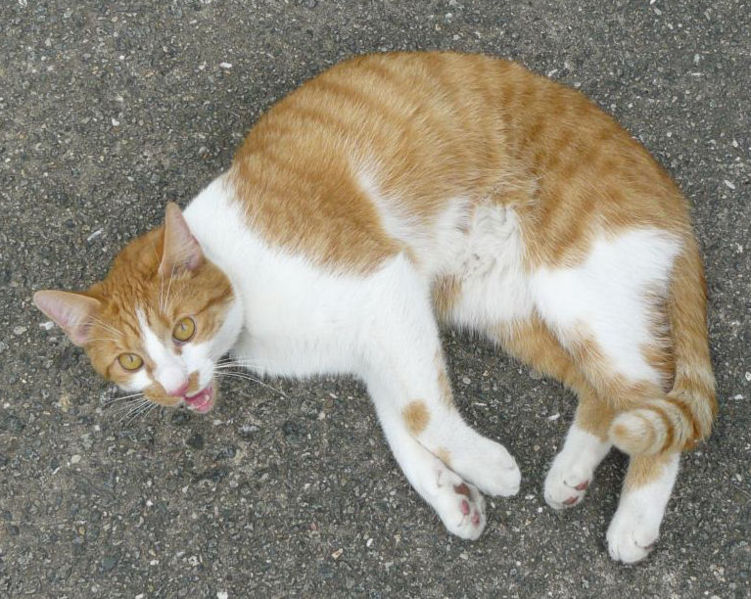Myth: Do cats always land on their feet?
Interview with
For this week's Mythconception, Kat Arney has been tackling a piece of scientific dogma... about cats.
dogma... about cats.
Kat -At the risk of offending any of our cat-loving listeners, I'm much more of a dog person, so this week I've been finding out what happens when you throw a cat out of a window. Before you complain, no animals were harmed during the making of this radio show. But I did want to discover if it's true that cats always land on their feet, no matter how far they fall, and that this enables them to survive falls from incredible heights.
As anyone who has a cat will know, they tend to have no problem with heights, and many of them love climbing all over the place. But this does mean that they can get into trouble, chasing a bird or bee through an open window, or off a balcony or rooftop. And although many of them do land on their feet unscathed, they can sustain serious injuries and even die as a result, especially if falling more than a few floors. So let's first take a look at what happens when they do make a successful four-footed touchdown - and then what goes wrong when they don't.
Cats - along with other animals including rats and rabbits - have something called an air-righting reflex. This means that when they sense they're falling and they're the wrong way up, they will attempt to flip over in the air in the hope of landing feet first. And because cats have an unusually flexible spine and don't really have collarbones, they're able to do this really well. It happens like this: first, they bend in the middle, so the front half of their body twists in the opposite direction to the back. Next, they tuck in their front legs, to make their front half twist further, and stick out their back legs so their back half twists less. That gets the front half the right way up - front feet underneath, head on top. Then they switch round, tucking in their back legs and sticking out their front legs, so the back half flips so their feet face the floor.
The cat righting reflex starts kicking in from when a kitten is around 3 or 4 weeks old, and by 6 to 7 weeks they've got it nailed, ensuring a safe landing from a height of several stories. There are a few things that can interfere with this though, and the first is falling from an insufficient height to execute their backflip move - they need to drop at least half a metre or so to have enough room to manoeuvre. Experiments with rats have shown that alcohol interferes with the righting reflex by messing about with the balance-sensing mechanisms in the ear. So if you got your cat drunk and threw it out of the window, it might struggle to land neatly - please don't try this at home!
The other big question is - do cats always manage to land on their feet from any height, and do they always escape unscathed? The answers to this depend on how far it's falling, and what it lands on. Cats can certainly break bones by landing on concrete or other hard surfaces from heights of more than about ten metres - so-called 'high rise syndrome' - as they can't absorb the shock, regardless of landing on their feet or not. But if they fall from more than about five stories, something interesting happens - they hit what's known as terminal velocity, when they're falling as fast as gravity will let them. There's some suggestion that in this situation, once a cat has got itself the right way up, it will relax and spread out, like a parachute, which might help to reduce injuries when it hits rock bottom.
Intriguingly, a study in the 1980s looking at vet records of cats brought in after falls suggested 90% of animals falling from buildings survived - and in fact their chances of surviving with fewer injuries were actually better if they fell from six or more stories than from lower heights, suggesting that the kitty parachute might be true.
Of course, there's an obvious alternative explanation - animals falling from greater heights might be much more likely to be dead on arrival so wouldn't be taken to the vet, skewing the statistics. And a more recent study showed that the further it falls, the more likely your moggy is to sustain serious injuries.
So while it's true that cats can - usually- land on their feet, they don't always make it out unscathed, and in some cases reach the end of their (also mythical) nine lives in a rather messy and tragic manner. Probably best to keep the windows shut if you want to keep your kitty in one piece.










Comments
why do cats land on their feet ?
I like this website because it gives you a lot of important facts
Add a comment